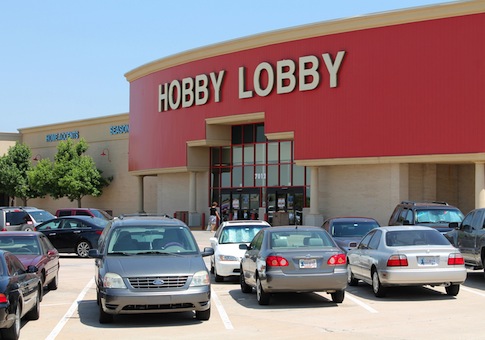The Supreme Court ruled on Monday the Obama administration’s implementation of Obamacare violated the religious liberty of several closely held businesses, most notably Hobby Lobby, and was consequently illegal.
The decision is quite limited in its scope and is not likely to cause many changes. However, it is a victory for more than just religious freedom, as it affirms the value of free association in American civic life.
The decision is notable not only for its high-profile content, but also for the partisan split on the Court. Republican presidents appointed all of the justices who voted in the majority of the 5-4 decision, while either Bill Clinton or Barack Obama appointed every justice in the minority.
A narrow ruling
Obamacare requires that all health insurance plans provide preventative care at no charge; the Obama administration interpreted this part of the law to mean that all insurance plans must give women 20 different kinds of contraception for free or face steep fines—the so-called "contraception mandate."
Hobby Lobby is owned and controlled by a Christian family that believes abortion is morally wrong. They view four of the 20 contraceptives as abortion-inducing and requested an exemption from being forced to give them to their employees.
The case revolved around the Religious Freedom Restoration Act, or RFRA, which passed congress nearly unanimously in 1993. That law requires the government prove a compelling interest in curtailing religious freedom while also proving it is acting in the least restrictive way necessary to achieve its end.
The majority opinion, written by Justice Samuel Alito, did not even examine whether the government has a compelling interest in giving women free access to contraceptives—it merely assumed that the government does and moved on to the second point.
While Hobby Lobby was facing millions of dollars in fines for not complying with the law, the Obama administration had granted exemptions from the requirement to religious nonprofit organizations. The administration created a way for female employees to receive the contraceptives for free without the organizations paying for them. The exemptions for nonprofit organizations proved that the Obama administration was not implementing the law in the least restrictive way possible.
"The effect of the HHS-created accommodation on the women employed by Hobby Lobby and the other companies involved in these cases would be precisely zero," Alito wrote for the majority, striking down the mandate.
Not just a win for religious freedom
The Court’s decision also asserted the liberty of people to form organizations—even businesses—that align with their personal religious principles.
"Congress provided protection for people like the Hahns and Greens by employing a familiar legal fiction: It included corporations within RFRA’s definition of ‘persons,’" Alito wrote. "But it is important to keep in mind that the purpose of this fiction is to provide protection for human beings. A corporation is simply a form of organization used by human beings to achieve desired ends."
By protecting Hobby Lobby’s religious freedom, the Court was protecting Hobby Lobby’s owners’ religious freedom, too. Just as people have the right to form and join nonprofit organizations that promote their own beliefs, they have the right to form for-profit businesses that align with their beliefs.
In other words, the court upheld the right to express beliefs not just as individuals but together in organizations.
An enraged left
The reaction to the Court’s decision by the liberal minority, Democratic politicians, and much of the media has been vociferous.
Justice Ruth Bader Ginsburg, writing for the minority, described the decision as having a "startling breadth" and would open up the floodgates to businesses "opt[ing] out of any law (saving only tax laws) they judge incompatible with their sincerely held religious beliefs."
Justice Anthony Kennedy, writing in a concurrence, disagreed.
"At the outset it should be said that the Court’s opinion does not have the breadth and sweep ascribed to it by the respectful and powerful dissent," Kennedy wrote at the beginning of his opinion.
Rep. Nancy Pelosi (D., Calif.), the minority leader in the House of Representatives, joined Ginsburg’s lamentations.
"Today, the Supreme Court took an outrageous step against the rights of America’s women, setting a dangerous precedent that could permit for-profit corporations to pick and choose which laws to obey," Pelosi said in a statement. "This deeply misguided and destructive decision is a serious blow to Americans’ ability to make their own health decisions."
Sen. Harry Reid ( D., Nev.), the Majority Leader of the Senate, made a similarly demonstrative pronouncement.
"Today’s decision jeopardizes women’s access to essential health care," Reid said in a statement. "Employers have no business intruding in the private health care decisions women make with their doctors."
The New York Times editorial board was similarly distraught.
"This was a political decision and it is absolutely proper for Democrats to use it as a weapon in the midterm election campaign," David Firestone wrote on the Times blog.
The impact of elections
The five justices in the majority—John Roberts, Clarence Thomas, Antonin Scalia, Kennedy, and Alito—were each appointed by President Ronald Reagan, George H.W. Bush, or George W. Bush. The four in the minority—Ginsburg, Stephen Breyer, Sonia Sotomayor, and Elena Kagan—were appointed by Democratic presidents.
Democrats, as the Times’ editorial board blog post pointed out, seem intent on using the decision to galvanize women ahead of the mid-term election this fall. However, since only the president can nominate justices to the Supreme Court, the 2016 presidential election will likely have a greater impact on the court’s composition.
